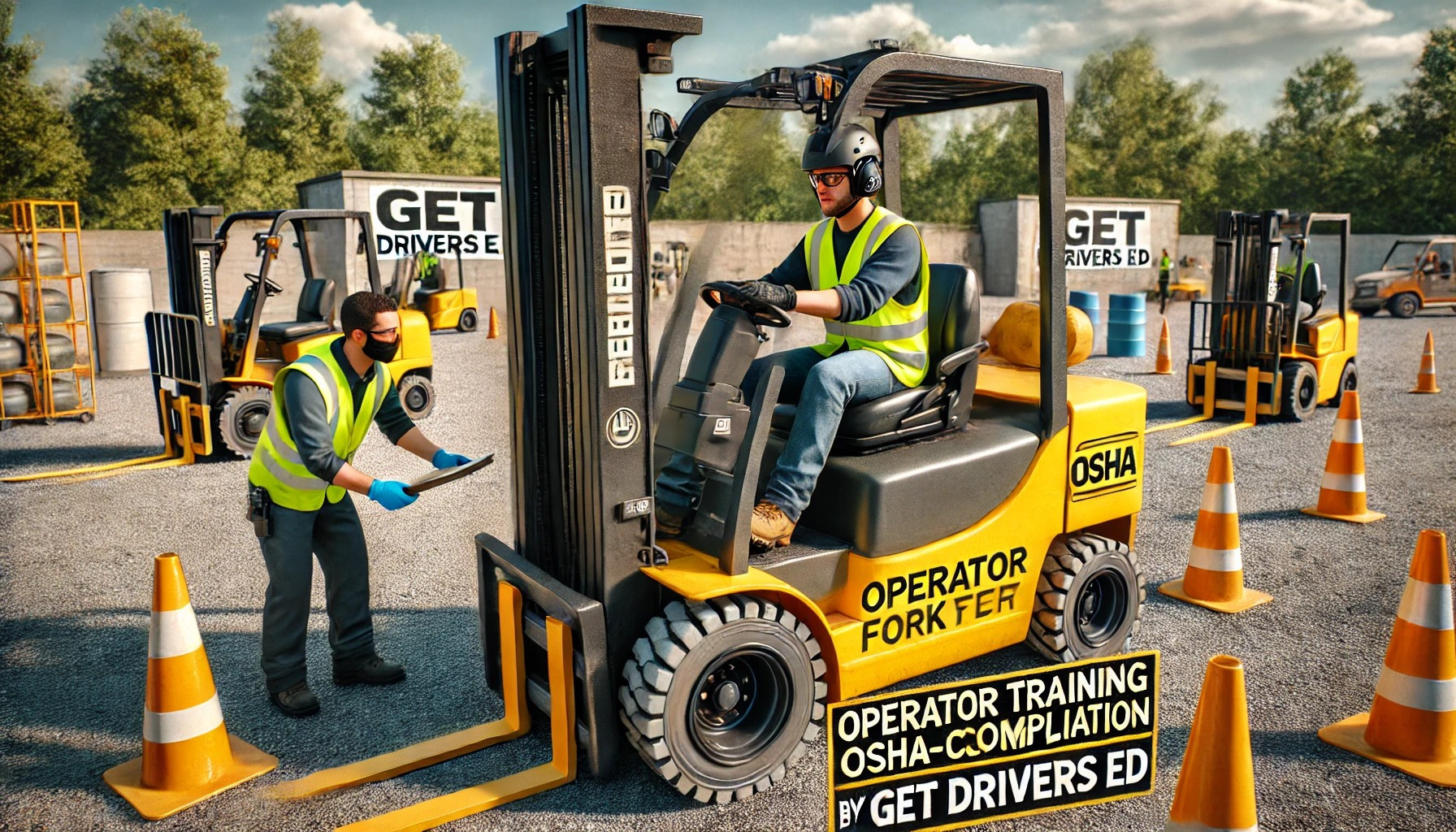Lift Smarter, Not Harder: Rough Terrain Forklift Certification Explained
Introduction: The Key to Safe and Efficient Forklift Operation
In construction sites, logging areas, and other rugged environments, rough terrain forklifts are indispensable tools. These heavy-duty machines are designed to navigate uneven surfaces, steep inclines, and challenging conditions while efficiently moving loads. However, operating a rough terrain forklift isn’t as simple as hopping in and lifting. It requires specialized training and certification to ensure safety and efficiency.
At Get Drivers Ed, we make obtaining your rough terrain forklift certification straightforward and accessible. In this blog, we’ll explore the importance of certification, what the training involves, and how it benefits both operators and employers.
Why Rough Terrain Forklift Certification Matters
1. Ensuring Workplace Safety
Operating a forklift on rough terrain comes with unique challenges. Without proper training, operators risk accidents such as tip-overs, load spills, or collisions. Certification equips drivers with the knowledge to handle these risks safely.
At Get Drivers Ed, our certification program emphasizes:
Safe load handling and weight distribution
Navigating uneven and challenging surfaces
2. Compliance with OSHA Standards
The Occupational Safety and Health Administration (OSHA) mandates that all forklift operators complete certified training. Employers who fail to comply face penalties, and uncertified operators may put themselves and others in danger.
3. Boosting Productivity
Certified operators work more efficiently, minimizing downtime caused by accidents or improper equipment handling. A well-trained operator can quickly and safely complete tasks, improving overall productivity.
4. Career Advancement Opportunities
Certification demonstrates professionalism and competence, making certified operators more attractive to employers and opening doors to higher-paying positions.
What Does Rough Terrain Forklift Certification Include?
1. Understanding Equipment Basics
Training begins with a thorough overview of rough terrain forklifts, including:
Components and controls
Pre-operation inspection and maintenance
2. Safe Operating Techniques
Operators learn essential skills, such as:
Maneuvering on uneven or sloped surfaces
Adjusting speed and load handling for challenging conditions
3. Hazard Awareness
Certification includes identifying and mitigating common hazards, such as:
Loose gravel or muddy terrain
Overhead obstructions
Tight spaces and limited visibility
4. Emergency Procedures
Operators are trained to respond effectively to emergencies, such as equipment malfunctions, load instability, or workplace accidents.
Benefits of Rough Terrain Forklift Certification
1. Reduced Accidents and Injuries
Comprehensive training minimizes the risk of workplace accidents, protecting both operators and coworkers.
2. Increased Equipment Longevity
Proper handling and regular maintenance, as taught in certification programs, extend the lifespan of forklifts and reduce repair costs.
3. Higher Job Satisfaction
Operators with certification feel more confident and competent in their roles, leading to greater job satisfaction and performance.
4. Enhanced Employer Reputation
Employers who prioritize certification demonstrate a commitment to safety and professionalism, boosting their reputation and attracting top talent.
Why Choose Get Drivers Ed for Rough Terrain Forklift Certification?
At Get Drivers Ed, we’re dedicated to providing high-quality training that meets OSHA standards and equips operators with the skills they need to excel. Here’s why we’re a trusted choice:
Comprehensive Curriculum: Our courses cover everything from equipment basics to advanced techniques.
Flexible Learning Options: Study at your own pace with our online platform, ideal for busy schedules.
Interactive Content: Engaging videos, quizzes, and real-world scenarios ensure effective learning.
Expert Instructors: Our experienced trainers are available to answer questions and provide guidance.
Tips for Operating Rough Terrain Forklifts Safely
Perform Pre-Operation Inspections: Check tires, brakes, and fluid levels before each use.
Follow Load Limits: Never exceed the forklift’s weight capacity.
Maintain a Slow and Steady Pace: Adjust your speed to match the terrain and load conditions.
Use Proper Safety Gear: Always wear protective equipment, such as hard hats and high-visibility clothing.
Stay Alert: Continuously monitor your surroundings for potential hazards.
How Certification Drives Workplace Success
1. Streamlined Operations
Certified operators complete tasks efficiently, reducing delays and ensuring smooth workflows.
2. Cost Savings
Fewer accidents and equipment damages mean lower costs for repairs, downtime, and insurance premiums.
3. Improved Morale
Investing in training shows employees that their safety and development are valued, fostering a positive work environment.
Conclusion: Lift Smarter with Proper Certification
Rough terrain forklifts are powerful tools that require skill and responsibility to operate safely. By obtaining rough terrain forklift certification, operators gain the knowledge and confidence to navigate challenging environments while prioritizing safety and efficiency.
At Get Drivers Ed, we simplify the certification process with engaging, OSHA-compliant training designed to help operators succeed. Whether you’re an employer seeking to enhance workplace safety or an operator looking to advance your career, we’re here to help you achieve your goals.
Ready to lift smarter, not harder? Visit Get Drivers Ed today to enroll in our rough terrain forklift certification program and elevate your skills!


